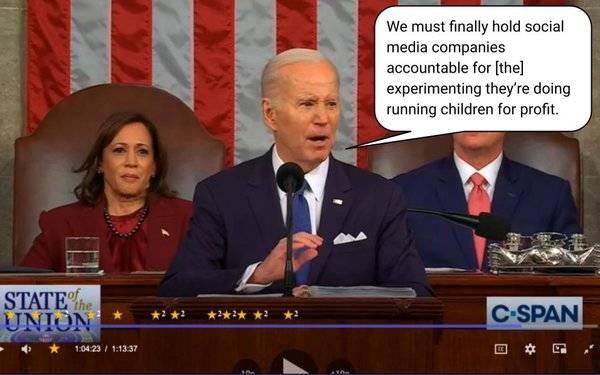
Ad industry groups responded to President Joe Biden's State
of the Union address, which called for new privacy laws, by reiterating their support for some form of national legislation, but making clear that they will oppose attempts to broadly restrict online
ad targeting.
Privacy legislation should “distinguish between harmful practices that should be prohibited and responsible data practices like advertising that provide valuable
information to consumers and are essential to innovation and economic growth,” the umbrella group Privacy for America stated Tuesday, shortly after the White House said Biden planned to seek strong limits on data collection and targeted
advertising.
Bob Liodice, CEO of the Association of National Advertisers, separately stated: “Digital advertising funds most popular apps, websites, and services, and businesses of every
size depend on such ads to reach new customers and grow, so we should make sure that any legislation is designed to address specific consumer harms and not out of a general antipathy toward any use of
data.”
advertisement
advertisement
"Through good-faith collaboration we can codify important data protections for consumers while protecting valuable ad-supported content and services," he added. "Our
common goal should be to stop unreasonable and unexpected data practices while allowing beneficial practices that drive innovation, growth, and consumer benefit."
Lartease Tiffith,
executive vice president for public policy at the Interactive Advertising Bureau, stated that the organization “supports stronger laws to protect kids,” but added that “blaming data
and technology for complex problems, and restricting or eliminating digital advertising, could severely diminish the benefits of the internet for everyone.”
Biden on Tuesday specifically
urged Congress to restrict data collection and targeted ads.
"It’s time to pass bipartisan legislation to stop Big Tech from collecting personal data on kids and teenagers online, ban
targeted advertising to children, and impose stricter limits on the personal data these companies collect on all of us," he said during the State of the Union address.
The ad industry has advocated for a national law since 2018, when California became the first
state in the country to pass a sweeping privacy law. But the types of privacy laws industry groups generally push for would largely codify self-regulatory principles, which broadly allow companies to
serve ads to people based on their activity across sites, on an opt-out basis.
For instance, Privacy for America's proposed framework for legislation would require companies to obtain consumers' opt-in consent before
collecting certain data the ad industry considers “sensitive,” including health, financial, geolocation and biometric data.
But that framework would also allow companies to collect
non-sensitive data and draw on that data for ad targeting, unless consumers opted out of “data personalization.”
The Privacy for America blueprint additionally would prohibit
companies from using data to make eligibility decisions about jobs, credit, insurance, healthcare, education, financial aid, or housing. Since 2012, the online ad industry's self-regulatory code has prohibited the collection or use of tracking data to determine
eligibility for employment, credit, health care or insurance.
Privacy for America also says it supports “robust safeguards for kids and teens that go beyond current federal
law.”